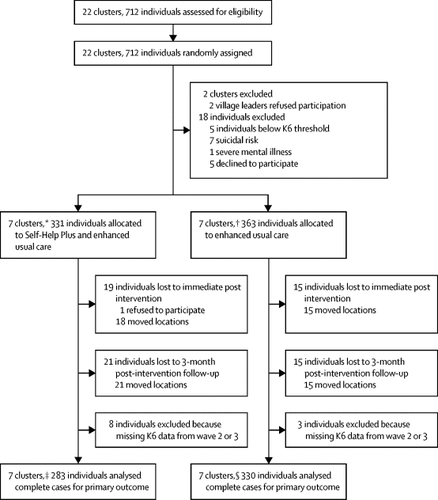The Lancet Global Health ( IF 34.3 ) Pub Date : 2020-01-22 , DOI: 10.1016/s2214-109x(19)30504-2 Wietse A Tol 1 , Marx R Leku 2 , Daniel P Lakin 3 , Kenneth Carswell 4 , Jura Augustinavicius 3 , Alex Adaku 5 , Teresa M Au 4 , Felicity L Brown 6 , Richard A Bryant 7 , Claudia Garcia-Moreno 8 , Rashelle J Musci 3 , Peter Ventevogel 9 , Ross G White 10 , Mark van Ommeren 4

|
Background
Innovative solutions are required to provide mental health support at scale in low-resource humanitarian contexts. We aimed to assess the effectiveness of a facilitator-guided, group-based, self-help intervention (Self-Help Plus) to reduce psychological distress in female refugees.
Methods
We did a cluster randomised trial in rural refugee settlements in northern Uganda. Participants were female South Sudanese refugees with at least moderate levels of psychological distress (cutoff ≥5 on the Kessler 6). The intervention comprised access to usual care and five 2-h audio-recorded stress-management workshops (20–30 refugees) led by briefly trained lay facilitators, accompanied by an illustrated self-help book. Villages were randomly assigned to either intervention (Self-Help Plus or enhanced usual care) on a 1:1 basis. Within 14 villages, randomly selected households were approached. Screening of women in households continued until 20–30 eligible participants were identified per site. The primary outcome was individual psychological distress, assessed using the Kessler 6 symptom checklist 1 week before, 1 week after, and 3 months after intervention, in the intention-to-treat population. All outcomes were measured at the individual (rather than cluster) level. Secondary outcomes included personally identified problems, post-traumatic stress, depression symptoms, feelings of anger, social interactions with other ethnic groups, functional impairment, and subjective wellbeing. Assessors were masked to allocation. This trial was prospectively registered at ISRCTN, number 50148022.
Findings
Of 694 eligible participants (331 Self-Help Plus, 363 enhanced usual care), 613 (88%) completed all assessments. Compared with controls, we found stronger improvements for Self-Help Plus on psychological distress 3 months post intervention (β −1·20, 95% CI −2·33 to −0·08; p=0·04; d −0·26). We also found larger improvements for Self-Help Plus 3 months post-intervention for five of eight secondary outcomes (effect size range −0·30 to −0·36). Refugees with different trauma exposure, length of time in settlements, and initial psychological distress benefited similarly. With regard to safety considerations, the independent data safety management board responded to six adverse events, and none were evaluated to be concerns in response to the intervention.
Interpretation
Self-Help Plus is an innovative, facilitator-guided, group-based self-help intervention that can be rapidly deployed to large numbers of participants, and resulted in meaningful reductions in psychological distress at 3 months among South Sudanese female refugees.
Funding
Research for Health in Humanitarian Crises (R2HC) Programme.
中文翻译:

引导自助减少乌干达南苏丹女性难民的心理困扰:一项整群随机试验。
背景
在资源匮乏的人道主义环境中,需要创新的解决方案来大规模提供心理健康支持。我们的目的是评估协调员引导的、基于群体的自助干预 (Self-Help Plus) 减少女性难民心理困扰的有效性。
方法
我们在乌干达北部的农村难民安置点进行了一项整群随机试验。参与者是至少有中度心理困扰的女性南苏丹难民(Kessler 6 的临界值≥5)。干预措施包括获得常规护理和五次 2 小时录音压力管理讲习班(20-30 名难民),由经过短期培训的非专业人员主持,并附有一本带插图的自助书。在 1:1 的基础上,村庄被随机分配到任一干预措施(自助加法或加强的常规护理)。在 14 个村庄中,随机选择了一些家庭。继续对家庭中的妇女进行筛查,直到每个站点确定 20-30 名符合条件的参与者。主要结果是个人心理困扰,使用 Kessler 6 症状清单在前 1 周、后 1 周、干预后 3 个月,在意向治疗人群中。所有结果均在个体(而不是集群)水平上进行测量。次要结果包括个人确定的问题、创伤后压力、抑郁症状、愤怒情绪、与其他种族群体的社会互动、功能障碍和主观幸福感。评估员被掩盖分配。该试验在 ISRCTN 进行了前瞻性注册,注册号为 50148022。
发现
在 694 名符合条件的参与者(331 名 Self-Help Plus,363 名增强型常规护理)中,613 名 (88%) 完成了所有评估。与对照组相比,我们发现 Self-Help Plus 在干预后 3 个月对心理困扰的改善更大(β -1·20,95% CI -2·33 至 -0·08;p=0·04;d -0· 26). 我们还发现干预后 3 个月的 Self-Help Plus 对八个次要结果中的五个有较大改善(效果大小范围 -0·30 至 -0·36)。具有不同创伤经历、定居点时间长短和最初心理痛苦的难民受益相似。关于安全方面的考虑,独立的数据安全管理委员会对六起不良事件做出了回应,但没有一件事被评估为对干预措施的关注。
解释
Self-Help Plus 是一种创新的、引导者引导的、基于群体的自助干预措施,可以快速部署到大量参与者中,并显着减少南苏丹女性难民 3 个月时的心理困扰。
资金
人道主义危机中的健康研究 (R2HC) 计划。



























 京公网安备 11010802027423号
京公网安备 11010802027423号